Project description by Wutopia Lab
“He stands upon the bones of the world in reminiscence, unaware that another world is being born.”
Yu Ting, Chief Architect of the interior design project.
Invitation
I had no idea who the architect was when I first received the design invitation. The client hoped for the architect and interior designer to work creatively back-to-back and then combine their creations, sparking inspiration for each other and producing a brilliant piece of work. This sounded undoubtedly like an adventure, and I, of course, accepted.
Vortex
The first set of documents I received was the ground plan confirmed by the transportation authority, with a diamond-shaped circular corridor surrounding a diamond-shaped exhibition hall. I was informed that the design should embody the spirit of Shanghai. At that time, I had just finished reading Underland: A Deep Time Journey, and there was a chapter about vortex which made me connect it to Shanghai. Shanghai has always been in the vortex of public opinion but always manages to create surprising achievements. I thought, what a great theme a vortex would be.
West Bund Orbit por Wutopia Lab. Fotografía por CreatAR Images.
I rotated the diamond plan and decided to design the exterior walls of the exhibition hall as a vortex. It would become the second layer of the façade behind the glass curtain wall.
I structured the entire interior design PLOT based on the theme of the vortex. The exhilarating vortex dominates the first storey, one that has a luxurious height of 10m. Inside the marble vortex is a clean and multifunctional grand event hall used for exhibitions, fashion shows, and conferences. The vortex pattern is reflected in the division of the circular corridor flooring, and at the same time creates a richly layered ceiling.
Different levels of patterns effectively conceal the structure and equipment pipelines between the facade and the exterior walls of the exhibition hall, allowing the vortex to stand out visually without being cluttered. The vortex becomes the dominant visual element, maximizing the tension of symbolic significance in a visual sense.
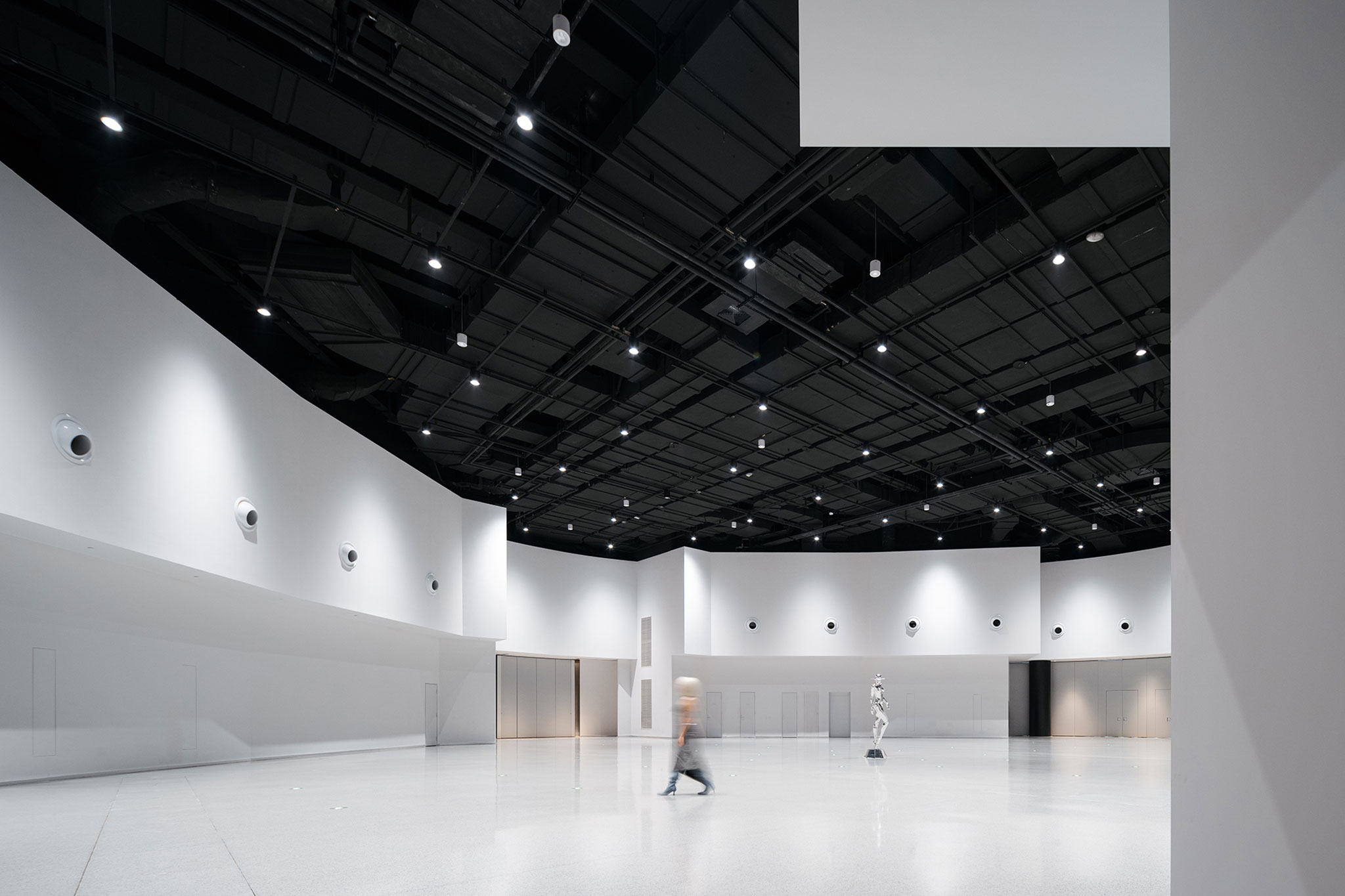
West Bund Orbit por Wutopia Lab. Fotografía por CreatAR Images.
The basement of Orbit serves functional purposes, housing public corridors, communal restrooms, communal dressing rooms and VIP dressing rooms. They represent the underwater world beneath the vortex. The architect created an underwater lighting experience in the corridors, and using three different colors of electroplated stone, along with coral-colored stone materials, he simultaneously constructed the symbolic meaning of an underwater coral reef on the basement level.
We were so enamored with the coral theme that we used green jade marble to craft the VVIP dressing room on the first floor. When the photographer captures an overhead shot of the dressing rooms from the mezzanine, it creates the illusion that the protagonists are in both a real and surreal myth.
The second floor is the exhibition hall, representing the calm water surface with ripples and shores left after the vortex. Behind the scenes on the second floor, all auxiliary functions such as the entrance hall, projection room, restrooms, VIP lounge, and various meeting rooms are hidden behind the shores – abstracted caves accommodating diverse needs.
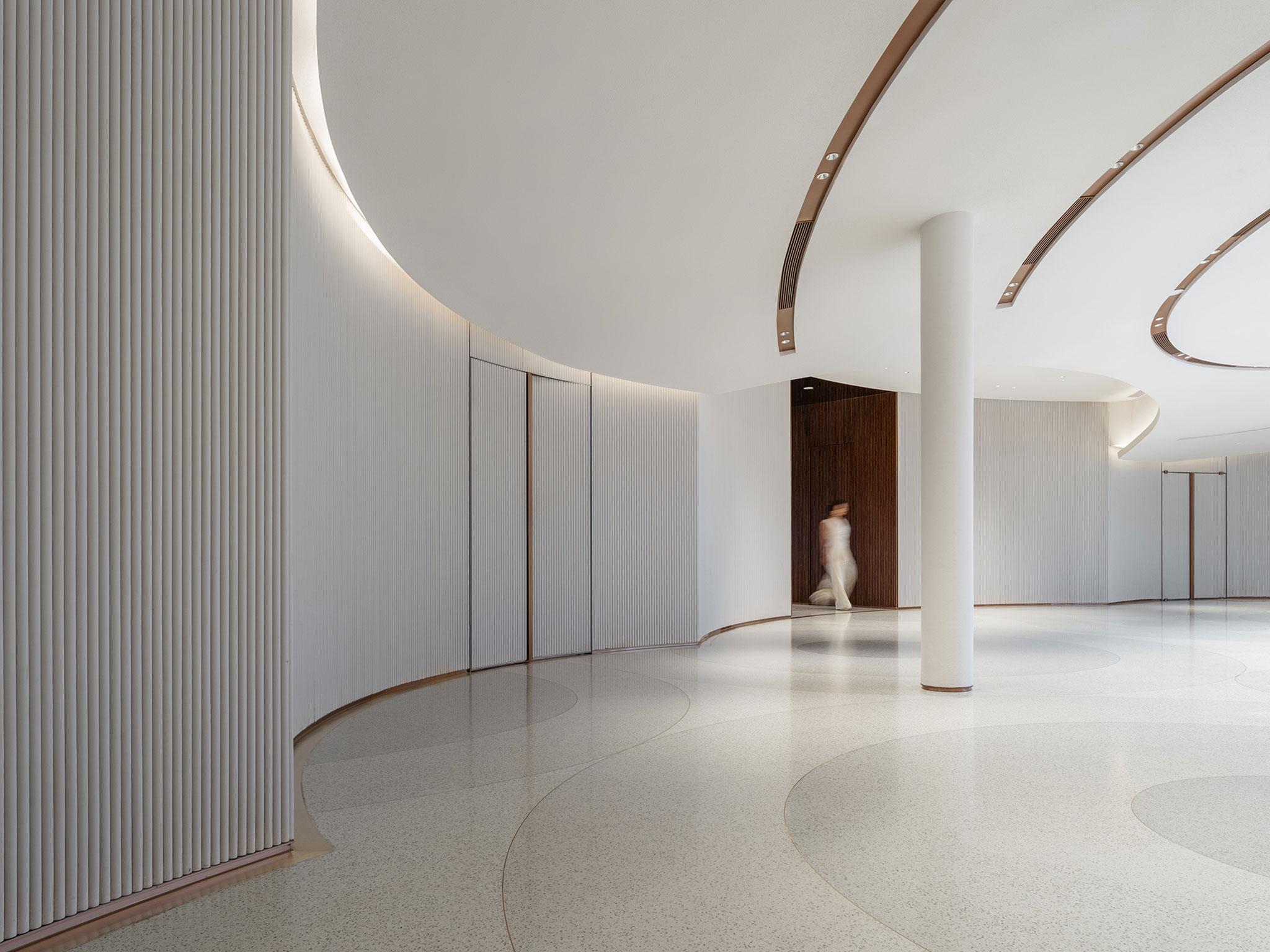
West Bund Orbit por Wutopia Lab. Fotografía por CreatAR Images.
Upon entering the second floor through the hall known as the ‘White Cliff,’ one can follow the scroll expressing the glorious moments of Xu Guangqi’s life or directly enter the main space filled with shimmering water reflections.
The expansive water surface serves as the hall for showcasing models. Based on the variable cross-section structure, I designed the roof ceiling as a slightly curved dome, creating a skylight that utilizes maximum net height to simulate the sky. Below the sky, there is a pattern of the Huangpu River, winding through island-like model platforms, leading to the subtly outlined gate of Tushan Bay.
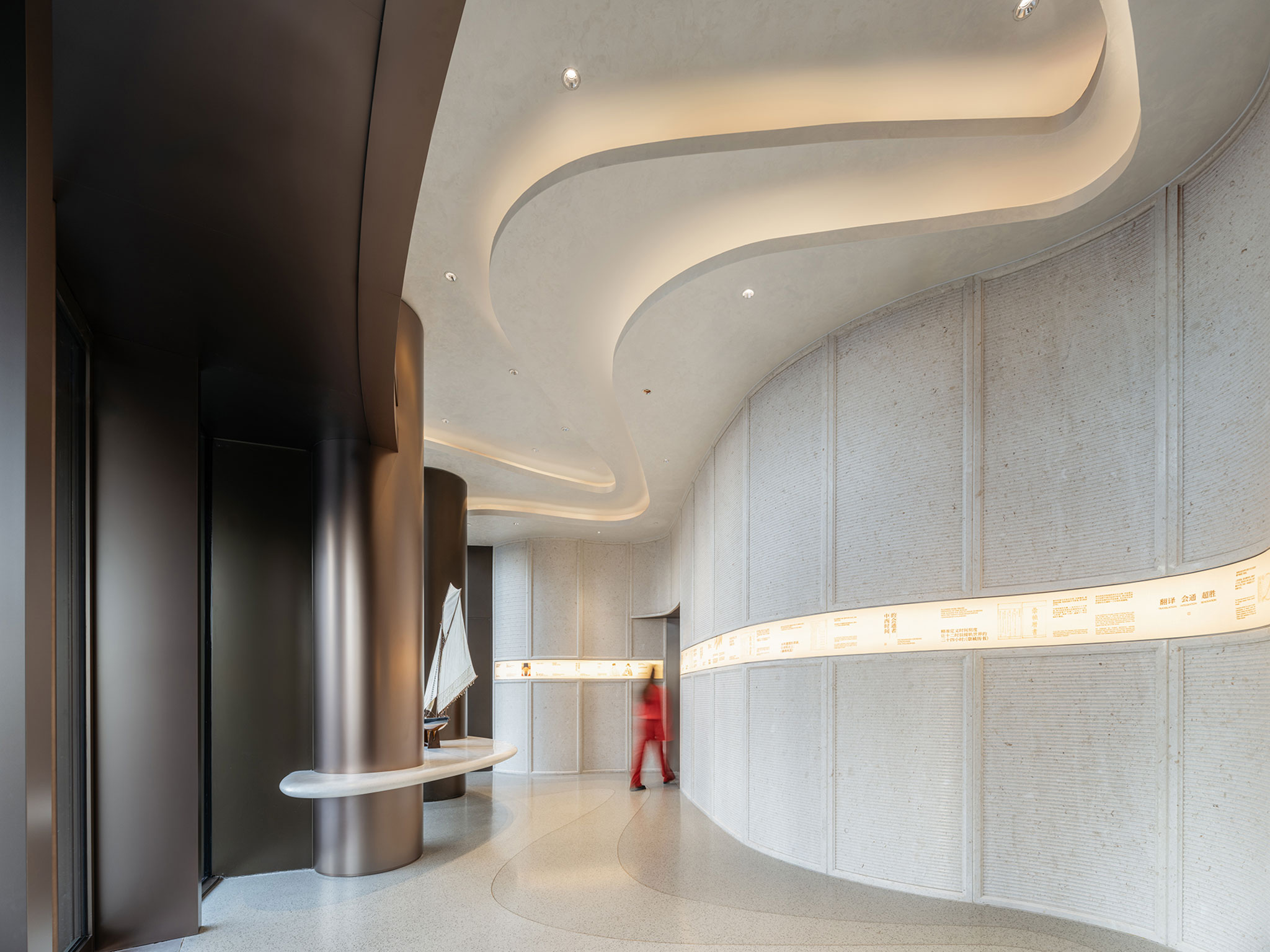
West Bund Orbit por Wutopia Lab. Fotografía por CreatAR Images.
Behind it is a large conference room, surrounded by lush greenery, resembling a forest, facing the slowly eastward-flowing Huangpu River. Reality and imagination converge at this moment, in this space.
Out of my fascination for symmetry and symbolism, as well as the refinement of the winding shores, the hall takes on the shape of a Begonia Ruyi, with a missing piece that serves as the anteroom to the restroom. In the central open space facing the hall, the architect placed a marble basin with rolling waves inside, creating a miniature vortex. Yes, the architecture thus creates joy infused with metaphor in every detail.
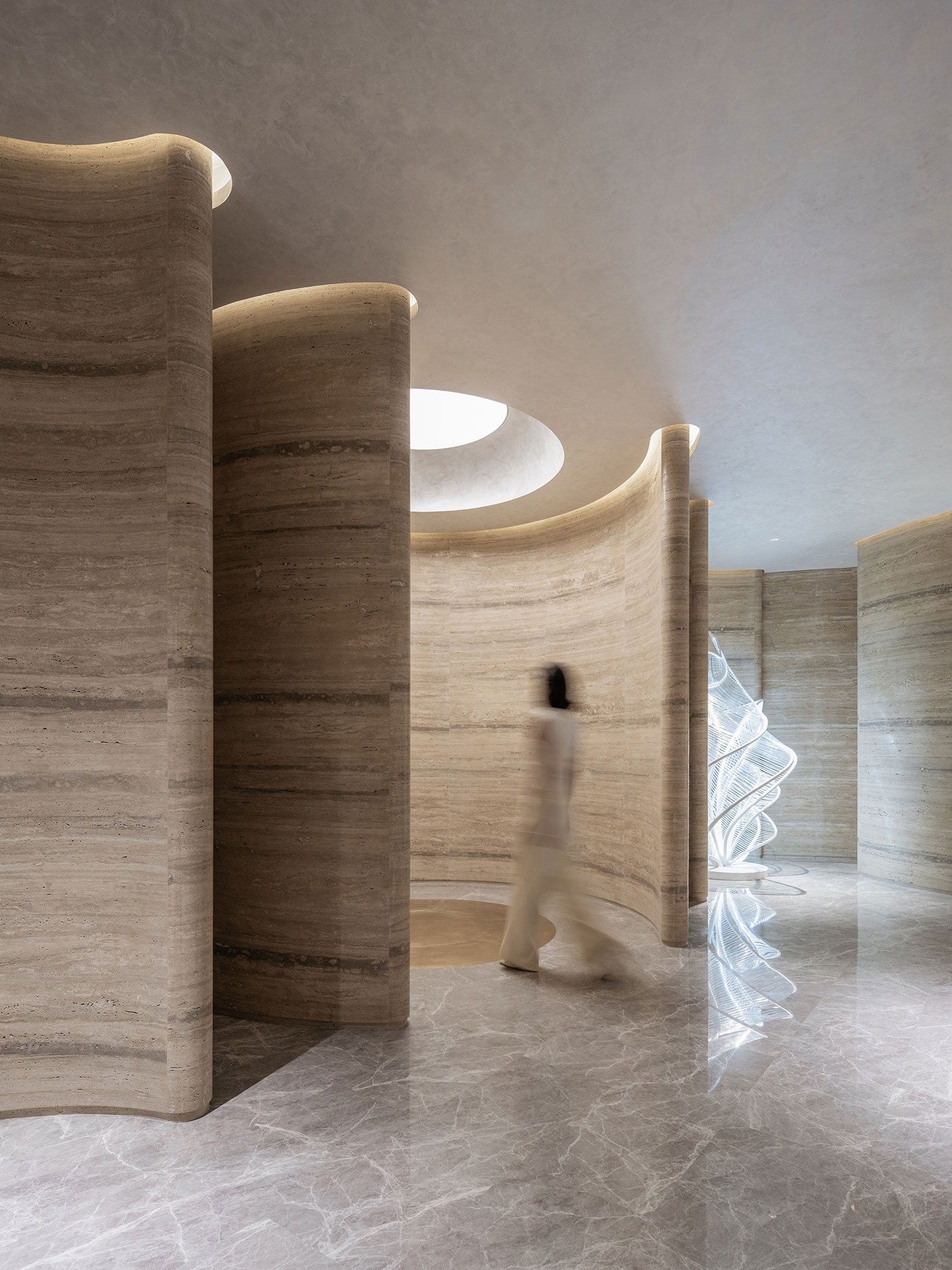
West Bund Orbit por Wutopia Lab. Fotografía por CreatAR Images.
Rogue Wave
While the interior concept proposal was approved by the owner, they also unveiled the facade design, which is the intertwined and spiraling ribbons seen now. The architect placed the vortex as the second facade behind the ribbon facade, and the developer exclaimed that it looked like a rogue wave.
The vortex as a giant wave was ultimately created by three-dimensional carving marble using a five-axis machine and then assembled on site. It indeed creates a Baroque perception, with the marble appearing solid yet expressing the dynamic force of fluid.
When you stand outside the building, it seems to be continuously rotating, forming a marvelous balance with the ribbon facade. Especially at night, it becomes a striking new landmark, a center, in the vibrant waterfront area of Shanghai.
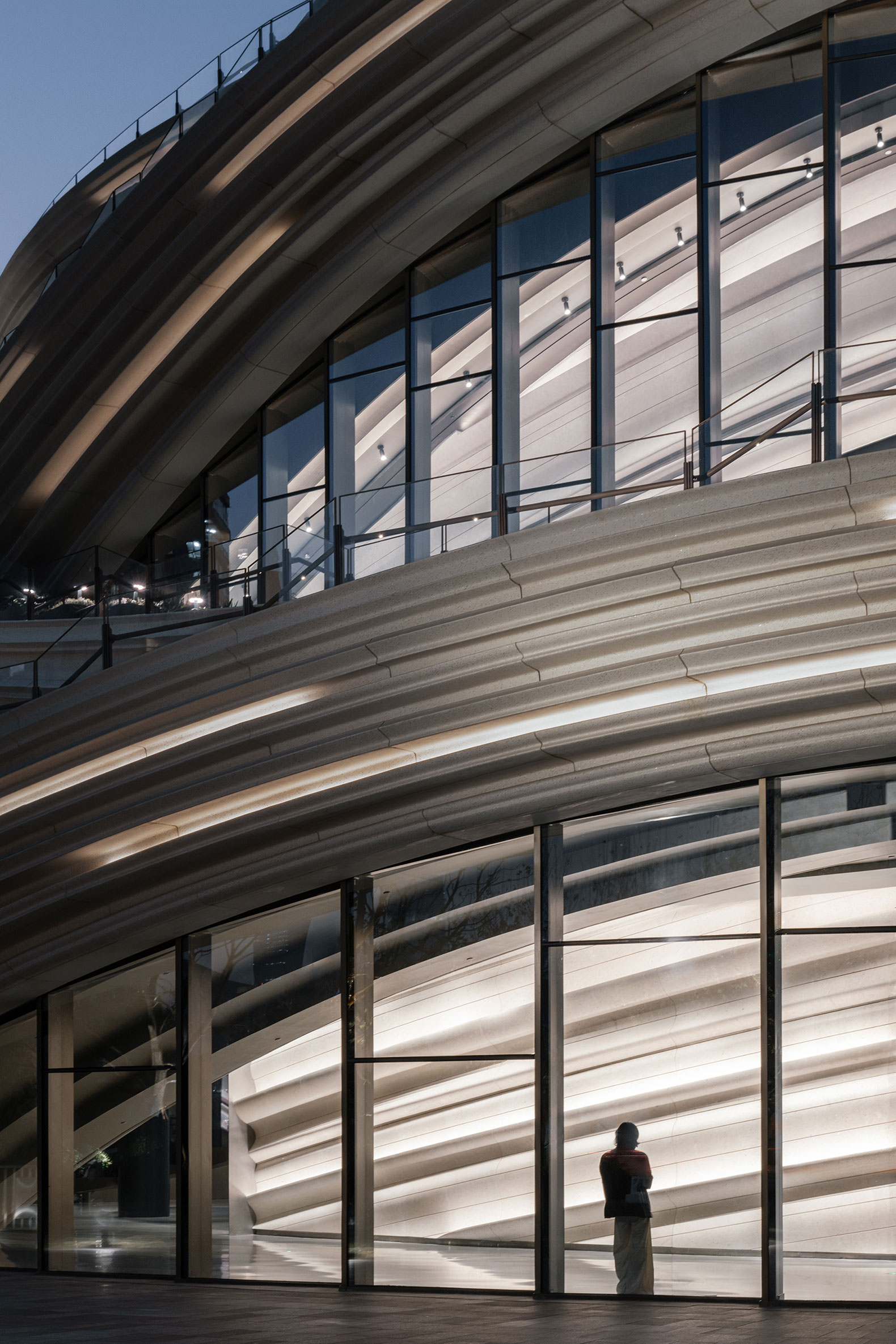
West Bund Orbit por Wutopia Lab. Fotografía por CreatAR Images.
Orbit and “西岸漩心”
The Chinese name for the exhibition hall, ‘西岸漩心’ (West Bund Orbit), derives from the poetic line ‘水理漩洑,鹏风翱翔’ (‘Water swirls and soars with the wind’). This powerful and dynamic phrase helps the audience connect the natural forms presented in architecture and interior design, such as waves, vortexes, ribbons, stars, and orbits. It aids in understanding that people are like stars, able to orbit outside the building along trajectories. Hence, the name ‘Orbit’ emerged.
Of course, it was only during the unveiling of the facade that I came to know the architect is Thomas.
“Each person harbors a secret Shanghai of their own, seemingly disconnected from others. These fragments are embedded within the vast and glittering metropolis, silent, or perhaps fading away. It takes someone to interconnect these fragmented, hidden Shanghais to suddenly realize that this is the living Shanghai. These fragments, then define the grand Shanghai we perceive.”
Yu Ting, Chief Architect of the interior design project.

